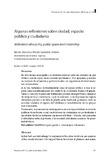Mostrar el registro sencillo del ítem
Algunas reflexiones sobre ciudad, espacio público y ciudadanía
| dc.rights.license | http://creativecommons.org/licenses/by-nc-sa/3.0/ve/ | |
| dc.contributor.author | Bernal, Marcelo | |
| dc.contributor.author | Mensa, Andrea | |
| dc.date.accessioned | 2009-11-11T15:45:51Z | |
| dc.date.available | 2009-11-11T15:45:51Z | |
| dc.date.issued | 2009-11-11T15:45:51Z | |
| dc.identifier.issn | 1317-9535 | es_VE |
| dc.identifier.uri | http://www.saber.ula.ve/handle/123456789/29784 | |
| dc.description.abstract | En este ensayo monográfico se intentará explicar cómo las ciudades en que vivimos son un espejo de la sociedad que tenemos. Nos apoyamos para ello en la visión de urbanistas y gestores locales con experiencia de intervenciones en la materia. A su vez, trataremos de fundamentar como el espacio público es hoy el espacio para la materialización del conflicto en sociedades duales y fragmentadas; y como de su adecuado tratamiento pueden emerger buenos ejemplos de integración y convivencia, o por el contrario, si en él priman las lógicas del interés privado o la falta de planificación territorial, podremos vivir en nuestras ciudades el regreso del tribalismo y la indefensión de los grupos más vulnerables. Finalmente, se planteará un interrogante acerca de la posibilidad de discutir políticas de inclusión social constructoras de ciudadanía, no ya diseñadas y ejecutadas desde las instancias superiores el Estado – Nación, sino pensadas y articuladas entre el gobierno y la sociedad civil atadas a marcos de proximidad física. | es_VE |
| dc.language.iso | es | es_VE |
| dc.rights | info:eu-repo/semantics/openAccess | |
| dc.subject | Espacio público | es_VE |
| dc.subject | Ciudadanía | es_VE |
| dc.subject | Urbanismo | es_VE |
| dc.title | Algunas reflexiones sobre ciudad, espacio público y ciudadanía | es_VE |
| dc.title.alternative | Reflections around city, public space and citizenship | es_VE |
| dc.type | info:eu-repo/semantics/article | |
| dc.description.abstract1 | In this test case will attempt to explain how the cities we live in are a mirror of the society we have. We support this in the vision of planners and managers with experience of intervention in the matter. In turn, we will try to explain how the public space today is the space for the developments of the conflict in dual and fragmented societies, and its proper treatment can emerge good examples of integration and coexistence, or conversely, if the initial the logic of the private interest or lack of planning, we can live in our cities the return of tribalism and helplessness of the most vulnerable groups. Finally, we pose a question about the possibility of discussing social inclusion policies and construction of citizenship, not designed and implemented from the top state - Nation, but thought out and articulated between government and civil society and tied to frames of physics proximity. | es_VE |
| dc.description.colacion | 41-65 | es_VE |
| dc.description.email | andremensa@hotmail.com | es_VE |
| dc.description.frecuencia | semestral | es_VE |
| dc.subject.centroinvestigacion | Centro Iberoamericano de Estudios Provinciales y Locales (CIEPROL) | es_VE |
| dc.subject.facultad | Facultad de Ciencias Jurídicas y Políticas | es_VE |
| dc.subject.keywords | Public space | es_VE |
| dc.subject.keywords | Citizenship | es_VE |
| dc.subject.keywords | Urbanism | es_VE |
| dc.subject.publicacionelectronica | Revista Provincia | es_VE |
| dc.subject.seccion | Revista Provincia: Artículos | es_VE |
| dc.subject.thematiccategory | Ciencias Económicas y Sociales | es_VE |
| dc.subject.thematiccategory | Ciencias Jurídicas y Políticas | es_VE |
| dc.subject.tipo | Revistas | es_VE |
| dc.type.media | Texto | es_VE |
Ficheros en el ítem
Este ítem aparece en la(s) siguiente(s) colección(ones)
-
Provincia - Número 022
julio - diciembre 2009



